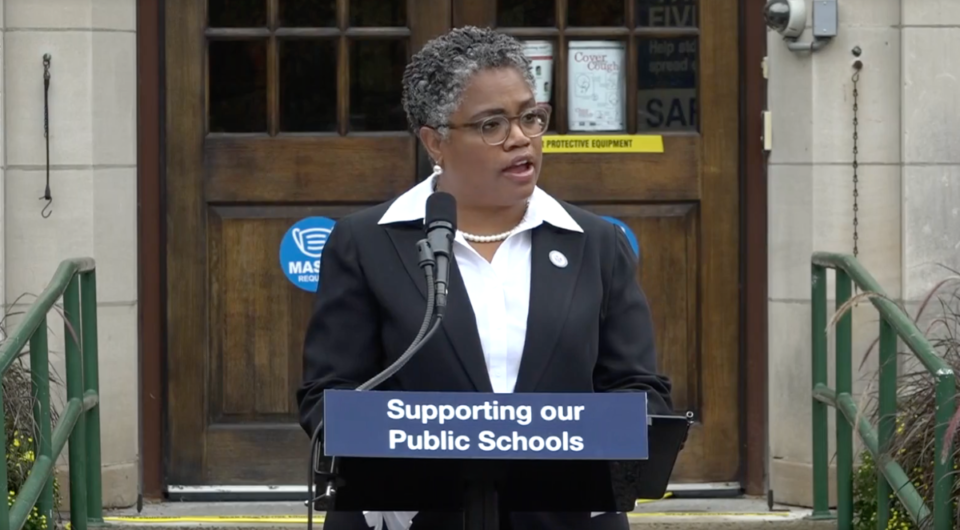
Promote Mental Health By Caring for the Adolescent Athlete–and the Person
April 6, 2023
TESTA: Murphy’s Education Department Is Shutting Down Public Participation on Revisions to Student Learning Standards
April 10, 2023Blood Pressures Rise As State Board and Murphy’s Commissioner Duke It Out Over High School Requirements
Let’s pretend the Centers for Disease Control decides to look at the number of Americans who have high blood pressure—more than half, depending on a variety of factors—and says, “this makes America look bad. We’re changing the benchmark for healthy blood pressure from 120/80 to 130/90. Problem solved!”
Yesterday at the State Board of Education meeting we saw this make-believe in action but board members didn’t sign off on Acting Commissioner Angelica Allen-McMillan ‘s decree that we lower the benchmark by which we measure educational health in high school. Next month the Board will vote on whether to follow her recommendation in order to inflate the percentage of students who earn passing marks on the high school graduation test in order to make New Jersey’s school system look good. Problem solved!
The test in question is the NJGPA which, under current state law,* NJ public school students take in 11th grade in order to show that they have proficiency in 10th grade reading and Algebra 1, with a bit of geometry thrown in. (Students that don’t meet proficiency standards just take another test or a school staff member submits a portfolio. Every student who shows up graduates.) School year 2021-2022 was the pilot year of NJGPA and the results were grim: only 39.4% of NJ 11th graders reached proficiency in reading (or ELA) and 49.4% reached proficiency in math.
In response, Allen-McMillan wants to lower the “cut score”—the number of points students need to reach “proficiency” on the NJGPA — from its current 750, which means “meets expectations,” to 725, which means “partially meets expectations.” This would dramatically raise the percentage of students who pass the test: 81% would reach “proficiency” in reading and 56.5% in math. In fact, she has a Resolution all set and ready to go. But the majority of the Board has to sign off.
What is in their way?
The utter lack of information provided by the DOE.
To be fair, some members feel they don’t need the information and are happy to accept Allen-McMillan’s proposal.
But yesterday other members had questions: Does a 725 or a 750 align with other highly-regarded assessments that show students won’t have to take remedial non-credit-bearing courses in college? What exactly are we measuring? For instance, according to the College Board, a 460 on the SAT reading section and a 510 on the math section (for 11th graders) signals college readiness. Shouldn’t the cut score for the NJGPA be equivalent to those benchmarks? Are they? No one seems to know. (My best guess as a non-psychometrician is that would be an argument for maintaining 750 as the cut score.) Since results from the tests students take in grades 3-8 also were quite low this year—36.1% of students met or exceeded expectations in NJSLA math and 49.3% met or exceeded expectations in reading—does accepting Allen-McMillan’s recommendation mean we’d lower the bar on those tests too?
[CORRECTION: The DOE did present the Board with what it said were SAT equivalents to the 725 and 750 cut-offs. For math, the DOE slide showed 440 on the SAT was equivalent to 725 on the NJGPA and 510 was equivalent to a 750. That may be accurate; I don’t know the source of that information and lack any documentation to make a judgement. However, according to the College Board, college-readiness on the SAT for 11th graders is as follows:
11th Grade Benchmarks
- Evidence-Based Reading and Writing: 460
- Math: 510
This is not the information relayed by the DOE to the State Board.]
Of course the DOE could have presented to the board a series of analyses with the data on hand linking the NJGPA with other third-party assessment or offered data on outcomes for NJ students who have met the SAT’s college benchmarks. Do they have to take remedial courses? Do they persist in earning their degrees?
But neither Allen-McMillan and other DOE staffers were forthcoming, with the Commissioner seeming to regard important queries as an affront to her authority. Yet without answers to their questions, the Board is forced to make a decision in a vacuum.
And so it was deja vu all over again as the Board debated overruling the DOE’s Resolution, just like it did last year.
Here’s a slightly edited version of the debate:
Board President Kathy Goldenberg: “We’re comparing apples and oranges.”
Arcelio Aponte: “Students knew [in spring 2022] that the NJGPA didn’t count so maybe they didn’t try. I think we should extend [the pilot of NJGPA] for another year with the 750…We should have experts in to help us understand what we’re debating.”
Nedd Johnson: “But we have to make our students whole.”
Joseph Ricca: “Let’s defer to the DOE. They are the experts.”
Vice President Andrew Mulvihill: “We’ve been down this road before. Some of us are afraid we’re lowering the standards and devaluing the diploma. When Chris Cerf was Commissioner, we made the test more rigorous [and] it was good for kids. In 2015 Essex County College 70% of kids took remedial courses. After we made the test more rigorous it dropped to 46%….We’re taking the approach, let’s set the score so most kids will pass the test. I’m taking the approach, what does a NJ diploma mean? We set standards, what we think you need to know. I’m with Arcelio. I think we stay at the 750. What’s the descriptors? At 750 you met expectations. At 725 you partially meet them. I want our kids to meet expectations. Nothing’s going to keep you from graduating…It will create more work for teachers. But students are the priority. I think the data is very important and having the alternative is there.”
Commissioner Allen-McMillan: “I must rely on the team of experts who put the 725 forth. I must highlight the distinction. We have very high standards in New Jersey, which is why we are consistently rated the #1 state school system** in the country. Our responsibility is to share with you the adverse impact the 750 will have on students. We talk about moving into college so every student can succeed but there are extenuating circumstances. We are the best in the nation at preparing students to succeed.”
Do we maintain high standards for our students or do we lower standards to perpetuate the pretense that our student have been prepared for success in college and careers?
That’s the question the Board must answer, with or without the DOE’s help.
In other news, the DOE announced the public release of the 2021=2022 data for School Performance Reports, which show an increase in discipline problem: Bullying reports rose 8.7%, with 30,568 incidents in 2021-2022 compared to 28,121 incidents in 2018-2019. Chronic absenteeism was up and there was a slight decrease in students taking pre-college tests like the SAT and ACT. Yet scores remain relatively high: The average reading and writing score was 538, while the average math score was 532, for a combined average score of 1,070. Enrollment in AP and IB courses remained stable.
*State law requires all NJ public high school students, traditional and charter, to pass a diploma-qualifying test in 11th grade. It would be fairer to change the law—either omit diploma-qualifying tests entirely or let students take end-of-course exams—but the the bill amending the law is stuck in State House purgatory.)
**New Jersey’s state school system is rated fourth in the nation.




